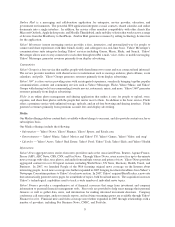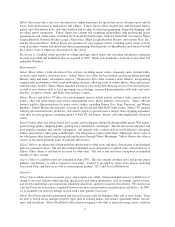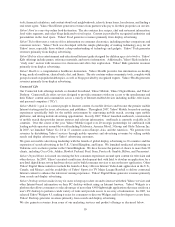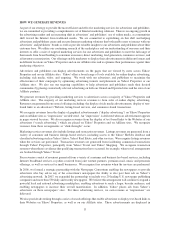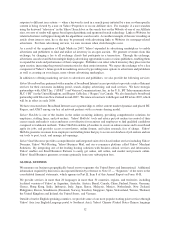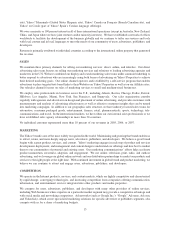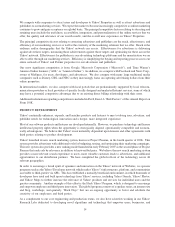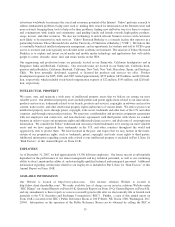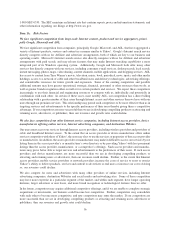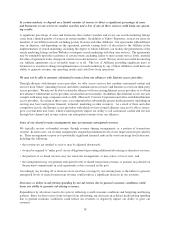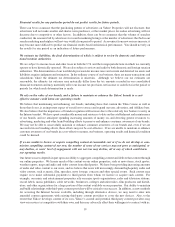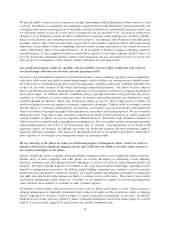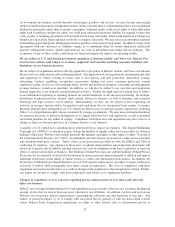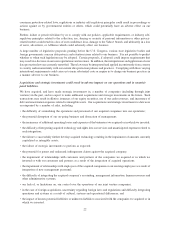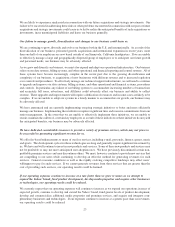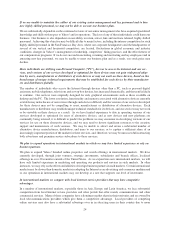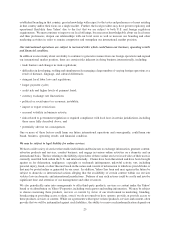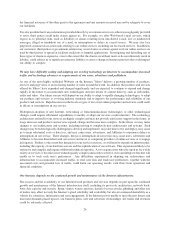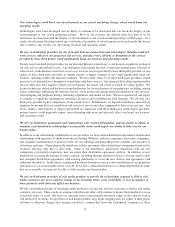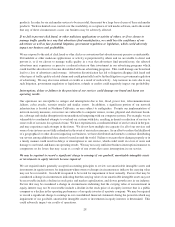Yahoo 2007 Annual Report Download - page 20
Download and view the complete annual report
Please find page 20 of the 2007 Yahoo annual report below. You can navigate through the pages in the report by either clicking on the pages listed below, or by using the keyword search tool below to find specific information within the annual report.In certain markets, we depend on a limited number of sources to direct a significant percentage of users
and businesses to our service to conduct searches and a loss of any of these sources could harm our operat-
ing results.
A significant percentage of users and businesses that conduct searches and access our search marketing listings
come from a limited number of sources in certain markets. In addition to Yahoo! Properties, sources for users are
members of our Affiliate network, including portals, browsers and other Affiliates. Our agreements with Affiliates
vary in duration, and depending on the agreement, provide varying levels of discretion to the Affiliate in the
implementation of search marketing, including the degree to which Affiliates can modify the presentation of the
search marketing listings on their Websites or integrate search marketing with their own services. The agreements
may be terminable upon the occurrence of certain events, including failure to meet certain service levels, material
breaches of agreement terms, changes in control or in some instances, at will. We may not be successful in renewing
our Affiliate agreements on as favorable terms or at all. The loss of Affiliates providing significant users or
businesses or an adverse change in implementation of search marketing by any of these Affiliates could harm our
ability to generate revenue, our operating results and cash flows from operations.
We may not be able to generate substantial revenues from our alliances with Internet access providers.
Through alliances with Internet access providers, we offer access services that combine customized content and
services from Yahoo! (including browser and other communications services) and Internet access from third-party
access providers. We may not be able to retain the alliances with our existing Internet access providers or to obtain
new alliances with Internet access providers on terms that are reasonable. In addition, these Internet access services
compete with many large companies such as AOL, Microsoft, Comcast Corporation and other established Internet
access providers. In certain of these cases, our competition has substantially greater market presence (including an
existing user base) and greater financial, technical, marketing or other resources. As a result of these and other
competitive factors, the Internet access providers with which we have formed alliances may not be able to attract,
grow or retain their user bases, which would negatively impact our ability to sell customized content and services
through this channel and, in turn, reduce our anticipated revenues from our alliances.
Some of our shared revenue arrangements may not generate anticipated revenues.
We typically receive co-branded revenue through revenue sharing arrangements or a portion of transactions
revenue. In some cases, our revenue arrangements require that minimum levels of user impressions be provided by
us. These arrangements expose us to potentially significant financial risks in the event our usage levels decrease,
including the following:
• the revenue we are entitled to receive may be adjusted downwards;
• we may be required to “make good” on our obligations by providing additional advertising or alternative services;
• the partners of co-brand services may not renew the arrangements or may renew at lower rates; and
• the arrangements may not generate anticipated levels of shared transactions revenue, or partners may default on
the payment commitments in such agreements as has occurred in the past.
Accordingly, any leveling off or decrease of our user base (or usage by our existing base) or the failure to generate
anticipated levels of shared transactions revenue could result in a significant decrease in our revenues.
Decreases or delays in advertising spending by our advertisers due to general economic conditions could
harm our ability to generate advertising revenues.
Expenditures by advertisers tend to be cyclical, reflecting overall economic conditions and budgeting and buying
patterns. Since we derive most of our revenues from advertising, any decreases in or delays in advertising spending
due to general economic conditions could reduce our revenues or negatively impact our ability to grow our
revenues.
18


